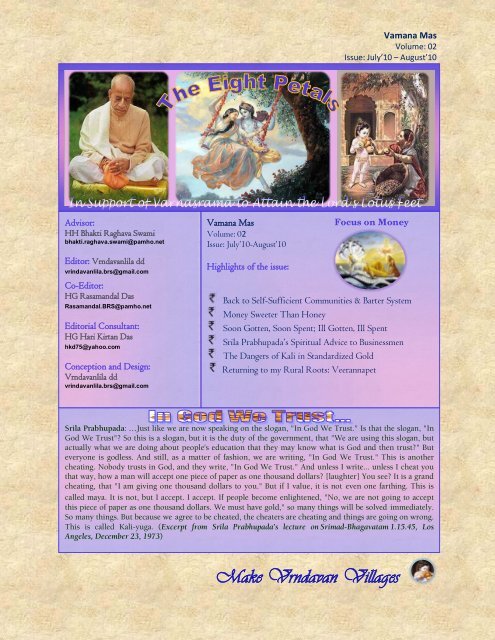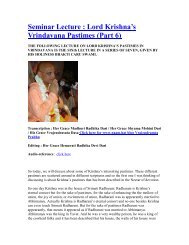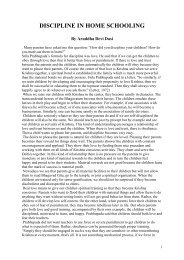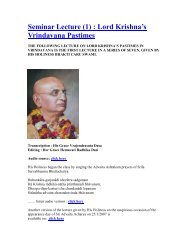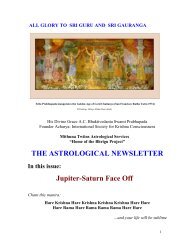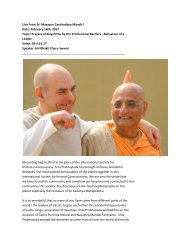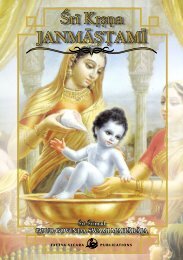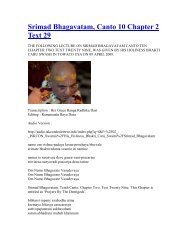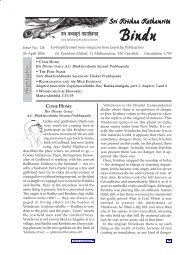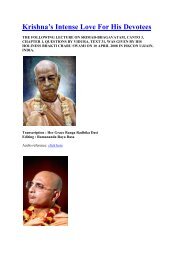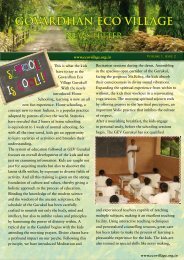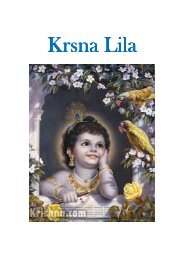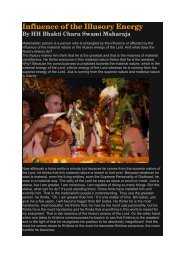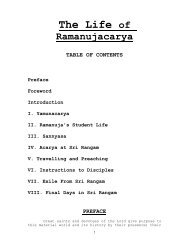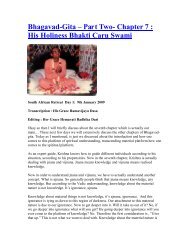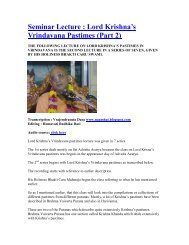Vamana Masa - ebooks - ISKCON desire tree
Vamana Masa - ebooks - ISKCON desire tree
Vamana Masa - ebooks - ISKCON desire tree
You also want an ePaper? Increase the reach of your titles
YUMPU automatically turns print PDFs into web optimized ePapers that Google loves.
<strong>Vamana</strong> MasVolume: 02Issue: July’10 – August’10Money is so dear that one conceives of money as being sweeter than honey. Therefore, who can give up the<strong>desire</strong> to accumulate money, especially in household life? Thieves, professional servants [soldiers] andmerchants try to acquire money even by risking their very dear lives. [SB 7.6.10]“Money is sweeter than honey” is a common expression which has a special significance for mostpeople living in today’s modern era of industrialization. The global politics of governance anddiplomacy now place more emphasis on artificial factory-based economic growth than on thetraditional natural agriculture-based growth of a country thus forcing people to live in such a waythat they will not be able to subsist without receiving a pay check at the end of the month. That is thepropaganda being promoted and to a large extent, that is today’s “reality of life”. The recent articleentitled “Need to Migrate Workers from Agriculture to Services for High Growth: RBI”, which appearedin the Press Trust of India in Mumbai on June 18, 2010 in no unclear terms give credence to this on-going policy.This trend is a global one which has been in practice now since many decades. That such an article appeared in apublic forum simply shows how governments take for granted that economic development through industrialization ismeant to be the norm for one and all. [http://beta.profit.ndtv.com/news/show/need-to-migrate-workers-fromagriculture-to-services-for-high-growth-rbi-75760]For most people in today’s modern world, if one does not receive a pay check at the end of the month, one cannotsurvive. Those who cannot join the labour force due to illness, lack of job opportunities, or sometimes due to sheerlaziness, will approach government established agencies in order to receive social assistance benefits commonlyreferred to in the West as “welfare assistance”. With rising unemployment in different countries, more and morepeople are either receiving a monthly “welfare check” or a monthly “unemployment check”. Others, who may bedisabled due to either natural calamities or due to the tragedies brought about by the modern way we live, mayreceive a monthly “disability pension check”. In some of the more “developed” countries people who reach 60 or 65years of age qualify to receive an “old age pension check” at the end of every month until they expire. All of this isextremely taxing on governments who can only meet such expenditures by levelling increased taxes upon the fewhealthy folks who can work.All of the above has come about due to severe deviations from the standard Vedic norms of life. The Vedic view oflife is that one should strive for self-realization and be satisfied with whatever Krishna arranges while working areasonable number of hours a day, the general norm being not more than eight. The goal of life was not based oneconomic development as we find in modern day society, but on self-development or self-realization. In the Vedicculture, the medium of exchange was not based on an artificial and fraudulent paper money currency but was basedrather on real wealth, gold coins and similar minerals. Actual wealth was measured in how much grains one had instock, in how many cows one protected and in how much land one cultivated. Before marriage, the criteria foraccepting a bridegroom was how many cows and how much land he owned.Canakya Pandita, one of the well known moralists of his times, stated that real happiness was not having to leavehome to make a living and not being a debtor. Srila Prabhupada made a similar statement when he said thatintelligence means not leaving the village and going to the cities to engage in hard labour. Canakya Pandita alsoexplained that three things should never be neglected: fire, disease and debts. According to the Vedic teachings,Make Vrndavan Villages
<strong>Vamana</strong> MasVolume: 02Issue: July’10 – August’10“one should own as much as he immediately needs.” [SB 7.13.36]. For this reason, Srila Bhaktisiddanta SarasvatiThakura would instruct his temple leaders to spend all they had received the same day and thus avoid keepingmoney which could be a source of anxiety.Dharma, Artha, Kama, and MoksaThe four pillars in the Vedic culture are found in 1) dharma (religion), 2) artha (money), 3) kama (satisfaction of thesenses) and 4) moksa (liberation). Vaisnavas generally reject these four activities thinking them to be maya andbinding one to this material world. However, these four activities can either be a source of bondage or a source ofliberation depending on the consciousness in which they are performed.Religion (dharma) practiced for selfish material motivation, money (artha) gained through non-traditional occupationsand for merely material pursuits, satisfaction of the senses (kama) performed merely for unrestricted self-centeredsense enjoyment and liberation (moksa) pursued for merging into brahman, will certainly bind one more and more tothis material world. However, these same activities of dharma, artha, kama and moksa when performed in properknowledge and understanding of the real goal of life can help one make steady progress in spiritual life. Thevarnasrama system gives this proper understanding and guidelines as to how such four activities are meant to beperformed in life, with a view of satisfying Lord Hari.Dharma should be performed in the context of devotional service (param dharma) which will result is “yayatmasuprasédati” [SB 12.6], where all things will be satisfied. Artha should be in keeping with the standard traditionaloccupations given within an agrarian based society (production of food and protection of cows, krishi go raksya [Bg18.43], being by far the most prominent activities) where the emphasis on self-sufficiency and the bartering systemresulted in most people not having to deal the local currency. Kama should be performed in a regulated way for thepurpose of keeping body and soul together with the goal and higher purpose of rendering devotional service to theLord. Moksa will then be automatically attained by one who performs the three above activities in such higherconsciousness.Modern Paper Currency FlawedWithin the system of varnasrama, three-fourth of the population does not earn money, namely the brahmacaris, thosein the vanaprastha and those in the sannyasa asrama. Grhasthas, in particular the ksatriya householders and thevaisya householders, assisted by the sudra householders, are meant to support the rest of society. The brahmanasand sudra class do not earn money, only the ksatriya class through taxation and the vaisya class, but only oneportion of the vaisya class, those engaged in trade, vanijyam. Those engaged in both krishi, agriculture and goraksya,cow protection, also do not deal with money but rather with goods.The real currency should be in minerals such as gold or silver, and the real wealth should be inhaving tangible goods such as land, cows, grains, etc. The artificial paper currency currently inuse is both artificial and fraudulent since it does not represent real wealth. Most countries in theworld are in severe debts (and increasing every year), including the USA, with only temporaryand flawed adjustments being made to salvage the present global economic crisis.It was only a few decades ago that in most countries of the world, the majority of people wereliving in rural areas and most people did not even need money. The land is meant to provide forall our necessities of life. Even in a country like Canada, going back to the early part of the 20thcentury when most Canadians were living in the country, practically speaking all their necessities were met from theland, including clothing and shelter.The Emerging Politics of Food Scarcity [http://www.earth-policy.org/]“The last century has seen ballooning populations develop impossible economies – all based on a dream ofperpetually cheap energy, and based on ignorance of the laws of finiteness in regards to all the natural elements thatmake our life possible. The cheap energy bubble is bursting, soil and water are in overdraft, and the result is acutevulnerabilities for nations who’ve exceed their resource base. Industrialized countries amongst these are passingthose vulnerabilities along – to nations that still have true wealth (soil, water) but who do not have socialMake Vrndavan Villages
<strong>Vamana</strong> MasVolume: 02Issue: July’10 – August’10infrastructures sufficient to properly protect them. Many poor [countries] are having their natural capital sold out fromunder them,” said Lester R. Brown, Earth Policy Institute .Spiritual EconomicsThe Vedic model of local and global economy is based on simplicity, psychology, logic, and Godconscious principles. Sriman Dhanesvara Das is well versed in the basic concepts of varnasramadharma and has deeply studied the essential teachings of the Bhagavad-gita in the context ofeconomy. He has compiled a Krishna conscious thesis in the form of a book entitled “SpiritualEconomics”. A portion of his introduction can help us gain more insight on the topic of money.“Spiritual Economics as a cross-disciplinary study combining psychology, economics and thespiritual science of the Bhagavad-gita explains why there is vulture capitalism, cut-throatcompetition, unending economic hardship, exploitation, inequity, and struggle in this world. "Spiritual Economics"explains the origin and solution of our ecological problems. "Spiritual Economics" explains why the present economicmethods can do nothing to solve these problems, reveals the actual source of our economic problems, and explainsthe only factual solution that can create an economy that serves everyone. "Spiritual Economics" explains the actualsource of our economic problems and how to solve them, once and for all.”A Memo From the PastWhat Have we Learned in 2064 Years?The following short message written during the time of the Roman Empire by Cicero (55 BC) gives us a little insightregarding the topic at hand:"The budget should be balanced, the Treasury should be refilled, public debt should be reduced, the arrogance ofofficialdom should be tempered and controlled, and the assistance to foreign lands should be curtailed lest Romebecome bankrupt. People must again learn to work, instead of living on public assistance." The answer is: “Nothing.”ConclusionAs widely advised by our acaryas, whatever money comes our way, we should utilize in the service of the Lord. TheVedic norm is that 50% of one’s income is meant to be used for helping spread Krishna consciousness. Money, whenthus used in the Lord’s service, becomes a means of liberation for the living entity. But money used for sensegratification, either self-centered or extended, becomes a source of bondage to this material world.The varnasrama system is so designed as to help us minimize and ultimately do away with the need for paper moneyby stressing a lifestyle of simple living and high thinking, in keeping with the principles of self-sufficiency andsustainability, depending on the mercy of the Lord.- HH Bhakti Raghava SwamiThis banking, fanking will collapse…Prabhupada: Everything I get. So I haven't got to go outside for exchange. If you are satisfied in your farm—I amsatisfied—then where is question of exchange? There is no need of artificial... So this banking, "fanking," everything willcollapse automatically. There is no money, who is going to keep money in the bank?Hari-Sauri: Who needs it?Prabhupada: [laughs] So this artificial way of banking, that will be also collapsed.Hari-Sauri: This is revolutionary.Ramesvar: It's very hard for the mind to...Prabhupada: No, simply do this.Ramesvar: Such a dramatic transformation of society.Prabhupada: Yes. Whatever it may be... We should be satisfied locally by our food, by our cloth, by our milk. That's all.Let the whole world go to hell. We don't care. If you want to save yourself also, you do this. Here is an example. If youwant artificial life, city life, and hellish life, you do. But we shall live like this. This is the ideal life.”[Excerpts from Srila Prabhupada’s conversations with his disciples, Bhuvaneshwar, January 21, 1977]Make Vrndavan Villages
<strong>Vamana</strong> MasVolume: 02Issue: July’10 – August’10• Varnashrama Musings- Vrndavanlila dd & HG Saci Kumar DasIn order to survive in the material world one needs to work. Srila Prabhupada says, “Karma”, youhave to work. You cannot maintain yourself without working. That is material world. Materialworld is not spiritual world. In the spiritual world you haven't got to work, neither you have to eat.Everything is complete. But in the material world means for your maintenance you have to work.” Inorder to earn money through the “sweat of their brow”, kaliyuga has introduced radical changes interms of definition of money and areas in which the sweat is shed and money earned.Most of the people are engaged in ugra karma, which is not advised. Prabhupada defined thatinescapable work as being “very simple”, which is to “Grow some food grains and keep some cows,take the milk, and just prepare nice foodstuff and eat.”The methods employed to earn money can be categorized in any of the 3 ways – sattva guna, rajo gunaand tamo guna. Money earned without cheating others or without performing sin may be called asmoney earned in goodness. Money earned by cheating others or through burglary or throughspeculation may falls as earned in passion. And money earned by performing sins like slaughteringanimals or selling liquor and such may be classified as one in the mode of ignorance.There is an English proverb - soon gotten money, soon spent; ill gotten money, ill spent. We, includingthe family members and even others who happen to use that money also partake the karma that accruesin earning that money. Their consciousness gets affected by the means. If money is earned throughsatvic means then it reflects in the behavior or overall condition of the recipient of that money. They arepious, they are helpful to others, they give charity and are generally free of anxiety, peaceful and thefamily enjoys the opulence over several generations. Such families are called "Garbha shrimant".Whereas, when the money is earned in rajo or tamo gunas or by unfair and sinful ways, the direct orindirect enjoyers of that money generally turn out to be sinful, selfish, mentally and physically diseased,and are constantly in a state of anxiety. Even when they are opulent, it does not last long. Their moneygoes away on liquor or on disease. They undergo its karmic reaction even in their future lives. Thus, itis extremely important to know and use proper (sattvic) means to earn money. In today's world manymethods of earning money are accepted as legal (considered fair) but it is not so spiritually. The Vedicand material yardsticks are different. For e.g., investing in stocks or in commodities. Almost everycompany is directly or indirectly involved in sinful activities as they release their shares in the market.Livelihood is earned by greedily exploiting the natural resources like oil drilling, mining etc;involvement in violent businesses like running hatcheries, slaughter houses, liquor trade etc; orbusinesses that pollute the environment like automobile or power generating industries etc. The list isendless. Agriculture, commerce, and cow protection (krsi-vanijya -go-raksha) are regarded asapproved activities of vaishyas or of earning livelihood. But all three of them are contaminated and weneed to be careful. We have already discussed commerce, but even in agriculture the scene demandscaution. With farmers growing cash crops instead of trying to meet food requirements, rampant usageof chemical fertilizers, now GM seeds, mechanized ways of farming through tractors etc hascontributed to its deterioration. Sadly it is the dairy industry which is contributing maximum to theexploitation of cows and bulls. The displacement of bulls from the ploughing scene and transport hasMake Vrndavan Villages
<strong>Vamana</strong> MasVolume: 02Issue: July’10 – August’10landed them in slaughter houses. The dairy industry views cows useful only as long as she is capable ofproducing milk and child bearing. Even the calf is considered a big liability in this world of ill definedutilities. The people dependent on those organizations or individuals only earn ugra karma forthemselves. This has resulted in forming a vicious circle of means and result. Everything is soprecariously placed in Kaliyuga. Everything is just the reverse of what it ought to be [Translation bySrila Prabhupada, BG 16.9: “…the demoniac, who are lost to themselves and who have no intelligence,engage in unbeneficial, horrible works meant to destroy the world.”]Now we face strange problem of global food crisis. India, the citadel of spiritual values and culture hasstooped so low that it ranks fourth in exporting beef. Is there any correlation between the two? It is timeto ponder that. Yes, there is a deep connection.etam drstim avastabhya/ nastatmano 'lpa-buddhayahprabhavanty ugra-karmanah / ksayaya jagato 'hitah [BG 16.9]The erstwhile leaders encourage this slaughterhouse civilization in the name of economic progress.There is propagation of usage of GM seeds, hybrid seeds in the name of agricultural development; thereis opening of our economy to the point of vulnerability in the name of globalization; there is opencheating in the name of giving paper money which does not exist! Our education system is such thatanything Vedic is scorned and everything ‘modern’/ ‘hep’ is revered. This ‘modern’ system has givenunemployment not only to human beings but also to the cows and bulls; it has given us inflation notonly in luxuries but even in food prices; it has given us broken families. It has taken away protectionfrom all the people who need it the most- cow, brahmanas, women, child, old, and diseased. In theVedic age there was no concept of goshalas, child labor, crèches, multi-specialty clinics or globalhospital chains; old age homes or bars simply because there was no such problem. The economy whichwas once so well-structured and was considered as the golden bird, is just a poor skeletal remnant of itsold prosperity. When a shudra occupies the leadership position these unwanted developments arebound to happen. Retrospection would reveal that the saving grace was ‘daiva-varnasrama’ fabric. Cowprotection and preservation of brahminical culture are interrelated. When the focus again shifts frommaterial concern to spiritual advancement, slowly these commodities and stock markets that have onlyprofit making as the objective, will give way to more Krsna-centric activities.“We cannot divert our attention for money making activities. If we direct our attention like others, thenit becomes karma. And karma is very dangerous for persons who want to go back to Godhead.” [SrilaPrabhupada, Letter: June 21, 1968]“Of all kinds of gifts, the gift of cows is applauded as the highest. Cows are the foremost of all things.Themselves sacred, they are the best of cleansers and sanctifiers. People should cherish cows forobtaining prosperity and even peace. Cows are said to represent the highest energy both in this worldand the world that is above. There is nothing that is more sacred or sanctifying thancows.” [cf. Mahabharata, Anusasana Parva, Sections LXXXIII - LXXVII - LXXVI]According to Srila Prabhupada an acre of land and a cow hold solution to one’s economic problem. Heclearly said, “The villagers, they have cows and land. That is sufficient for their economic problem.” Inorder to uphold these value systems, it is important that we have Krsna-centric localized farmcommunities. It is these communities which uphold the key to spiritual progress through reducedmaterial concerns while ensuring self-sufficiency and sustainability. Hare Krsna!Henry Ford: “It is well that the people of the nation do not understand our banking and monetarysystem, for if they did, I believe there would be a revolution before tomorrow morning.”Make Vrndavan Villages
<strong>Vamana</strong> MasVolume: 02Issue: July’10 – August’10Today's subject is “Culture and Business.” We understand business to mean “occupational duty.” According to ourVedic culture, there are different types of business. As described in Bhagavad-gita (4.13), catur-varnyam mayasrstam guna-karma-vibhagasah. The four divisions of the social system, based on people's qualities and types ofwork, are the brahmanas [intellectuals and teachers], the ksatriyas [military men and state leaders], the vaisyas[farmers and merchants], and the sudras [laborers]. Before doing business, one must know what kinds of work thereare and who can do what kind of work. People have different capabilities, and there are different types of work, butnow we have created a society where everyone takes up everyone else's business. That is not very scientific.Society has natural cultural divisions, just as there are natural divisions in the human body. The whole body is oneunit, but it has different departments, also--for example, the head department, the arm department, the bellydepartment, and the leg department. This is scientific. So in society the head department is represented by thebrahmana, the arm department by the ksatriya, the belly department by the vaisya, and the leg department by thesudra. Business should be divided scientifically in this way.The head department is the most important department, because without the head the other departments--the arm,the belly, and the leg--cannot function. If the arm department is lacking, business can still go on. If the leg departmentis lacking, business can go on. But if the head department is not there--if your head is cut off from your body--theneven though you have arms, legs, and a belly, they are all useless. The head is meant for culture. Without culture,every type of business creates confusion and chaos. And that is what we have at the present moment, because ofjumbling of different types of business. So there must be one section of people, the head department, who giveadvice to the other departments. These advisors are the intelligent and qualified brahmanas.samo damas tapah saucam ksantir arjavam eva cajnanam vijnanam astikyam brahma-karma svabhava-jam"Peacefulness, self-control, austerity, purity, tolerance, honesty, knowledge, wisdom, and religiousness--these arethe natural qualities by which the brahmanas work." [Bhagavad-gita 18.42]The brahmanas, the head of the social body, are meant to guide society in culture. Culture means knowing the aim oflife. Without understanding the aim of life, a man is a ship without a rudder. But at the present moment we aremissing the goal of life because there is no head department in society. The whole human society is now lacking realbrahmanas to give advice to the other departments. Arjuna is a good example of how a member of the ksatriyadepartment should take advice. He was a military man; his business was to fight. In the battle of Kuruksetra heengaged in his business, but at the same time he took the advice of the brahmanya-deva, Lord Krsna. As it is said,namo brahmanya-devaya go-brahmana-hitaya cajagad-dhitaya krsnaya govindaya namo namah"Let me offer my respectful obeisances unto Lord Krsna, who is the worshipable Deity for all brahminical men, who isthe well-wisher of cows and brahmanas, and who is always benefiting the whole world. I offer my repeatedobeisances to the Personality of Godhead, known as Krsna and Govinda." [Visnú Purana 1.19.65]In this verse the first things taken into consideration are the cows and the brahmanas (go-brahmana). Why are theystressed? Because a society with no brahminical culture and no cow protection is not a human society but a chaotic,animalistic society. And any business you do in a chaotic condition will never be perfect. business can be done nicelyonly in a society following a proper cultural system. Instructions for a perfect cultural system are given in Srimad-Bhagavatam. At a meeting in the forest of Naimisaranya, where many learned scholars and brahmanas hadassembled and Srila Suta Gosvami was giving instructions, he stressed the varnasrama social system (atah pumbhirdvija-srestha varnasrama-vibhagasah). The Vedic culture organizes society into four varnas [occupational divisions]and four asramas [spiritual stages of life]. As mentioned before, the varnas are the brahmana, ksatriya, vaisya, andMake Vrndavan Villages
<strong>Vamana</strong> MasVolume: 02Issue: July’10 – August’10sudra. The asramas are the brahmacari-asrama [celibate student life], grhastha-asrama [family life], vanaprasthaasrama[retired life], and sannyasa-asrama [renounced life]. Unless we take to this institution of varnasrama-dharma,the whole society will be chaotic. And the purpose of varnasrama-dharma is to satisfy the Supreme Lord. As stated inthe Visnu Purana (3.8.9),Varnasramacaravata purusena parah pumanvisnur aradhyate pantha nanyat tat-tosa-karanamAccording to this verse, one has to satisfy the Supreme Lord by properly performing one's prescribed dutiesaccording to the system of varna and asrama. In a state, you have to satisfy your government. If you don't, you are abad citizen and cause chaos in society. Similarly, in the cosmic state--that is, in this material creation as a whole--ifyou do not satisfy the Supreme Lord, the proprietor of everything, then there will be a chaotic condition. Our Vedicculture teaches that whatever you do, you must satisfy the Supreme Lord. That is real culture.Sva-karmana tamabhyarcya siddhim vindati manavah. You may do any business--the brahmana's business, the ksatriya's business,the vaisya's business, or the sudra's business--but by your business you should satisfy the Supreme Personality ofGodhead. You may be a merchant, a professional man, a legal advisor, a medical man--it doesn't matter. But if youwant perfection in your business, then you must try to satisfy the Supreme Personality of Godhead. Otherwise youare simply wasting your time. In Bhagavad-gita (3.9), Lord Krsna says, yajnarthat karmanah. The word yajna refers toVisnu, or Krsna, the Supreme Lord. You have to work for Him. Otherwise you become bound by the reactions of youractivities (anyatra loko 'yam karma-bandhanah). And as long as you are in the bondage of karma, you have totransmigrate from one body to another. Unfortunately, at the present moment people do not know that there is a souland that the soul transmigrates from one body to another. As stated in Bhagavad-gita (2.13), tatha dehantara-praptih:"When the body dies, the soul transmigrates to another body." I've talked with big, big scientists and professors whodo not know that there is life after death. They do not know. But according to our Vedic information, there is life afterdeath. And we can experience transmigration of the soul in this present life. It is a very common thing: A baby soongets the body of a boy, the boy then gets the body of a young man, and the young man gets the body of an old man.Similarly, the old man, after the annihilation of his body, will get another body. It is quite natural and logical. Actually,we have two bodies, the gross body and the subtle body. The gross body is made up of our senses and the bodilyelements--bones, blood, and so on. When we change our body at death, the present gross body is destroyed, but thesubtle body, made of mind, intelligence, and ego, is not. The subtle body carries us to our next gross body. It is justlike what happens when we sleep. At night we forget about the gross body, and the subtle body alone works. As wedream we are taken away from our home, from our bed, to some other place, and we completely forget the grossbody. When our sleep is over we forget about the dream and become attached again to the gross body. This is goingon in our daily experience. So we are the observer, sometimes of the gross body and sometimes of the subtle body.Both bodies are changing, but we are the unchanging observer, the soul within the bodies. Therefore, our inquiryshould be, "What is my position? At night I forget my gross body, and during the daytime I forget my subtle body.Then what is my real body?" These are the questions we should ask.So you may do your business, as Arjuna did his business. He was a fighter, a ksatriya, but he did not forget hisculture, hearing Gita from the master. But if you simply do business and do not cultivate your spiritual life, then yourbusiness is a useless waste of time (srama eva hi kevalam). Our Krsna consciousness movement is being spread sothat you do not forget your cultural life. We do not say that you stop your business and become a sannyasi like meand give up everything. We do not say that. Nor did Krsna say that. Krsna never said, "Arjuna, give up your fightingbusiness." No, He said, "Arjuna, you are a ksatriya. You are declining to fight, saying, 'Oh, it is very abominable.' Youshould not say that. You must fight." That was Krsna's instruction. Similarly, we Krsna conscious people are alsoadvising everyone, "Don't give up your business. Go on with your business, but simply hear about Krsna." CaitanyaMahaprabhu also said this, quoting from Srimad-Bhagavatam: sthane sthitah sruti-gatam tanu-van-manobhih.Caitanya Mahaprabhu never said, "Give up your position." Giving up one's position is not very difficult. But to cultivatespiritual knowledge while one stays in his position--that is required. Among the animals there is no cultivation ofspiritual life. That is not possible; the animals cannot cultivate this knowledge. Therefore, if human beings do notcultivate spiritual knowledge, they're exactly like animals (dharmena hinah pasubhih samanah). So we should beMake Vrndavan Villages
<strong>Vamana</strong> MasVolume: 02Issue: July’10 – August’10very conscious about our eternal existence. We, the spirit soul within the body, are eternal (na hanyate hanyamanesarire). We are not going to die after the annihilation of our body. This is the cultivation of knowledge, or brahmajijnasa,which means inquiry about one's self. Caitanya Mahaprabhu's first disciple, Sanatana Gosvami, was formerlyfinance minister in the government of Nawab Hussein Shah. Then he retired and approached Caitanya Mahaprabhuand humbly said, "My dear Lord, people call me pandita." (Because he was a brahmana by caste, naturally he wascalled pandita, meaning "a learned person.") "But I am such a pandita," he said, "that I do not even know who or whatI am." This is the position of everyone. You may be a businessman or you may be in another profession, but if you donot know what you are, wherefrom you have come, why you are under the tribulations of the laws of material nature,and where you are going in your next life--if you do not know these things, then whatever you are doing is useless.As stated in Srimad-Bhagavatam (1.2.8),dharmah svanusthitah pumsam visvaksena-kathasu yahnotpadayed yadi ratim srama eva hi kevalam"The occupational activities a man performs according to his own position are only so much useless labor if they donot provoke attraction for the message of the Personality of Godhead." Therefore our request to everyone is thatwhile you engage in your business, in whatever position Krsna has posted you, do your duty nicely, but do not forgetto cultivate Krsna knowledge. Krsna knowledge means God consciousness. We must know that we are part andparcel of God (mamaivamso jiva-loke jiva-bhutah sanatanah). We are eternally part and parcel of Krsna, or God, butwe are now struggling with the mind and senses (manah sasthanindriyani prakrti-sthani karsati). Why this struggle forexistence? We must inquire about our eternal life beyond this temporary life. Suppose in this temporary life I becomea big businessman for, say, twenty years or fifty years or at the utmost one hundred years. There is no guaranteethat in my next life I'm going to be a big businessman. No. There is no such guarantee. But this we do not care about.We are taking care of our present small span of life, but we are not taking care of our eternal life. That is our mistake.In this life I may be a very great businessman, but in my next life, by my karma, I may become something else. Thereare 8,400,000 forms of life. Jalaja nava-laksani sthavara laksa-vimsatih: There are 900,000 forms of life in the water,and 2,000,000 forms of <strong>tree</strong>s and other plants. Then, krmayo rudra-sankhyakah paksinam dasa-laksanam: There are1,100,000 species of insects and reptiles, and 1,000,000 species of birds. Finally, trimsal-laksani pasavah caturlaksanimanusah: There are 3,000,000 varieties of beasts and 400,000 human species. So we must pass through8,000,000 different forms of life before we come to the human form of life. Therefore Prahlada Maharaja says,kaumara acaret prajno dharman bhagavatan ihadurlabham manusam janma tad apy adhruvam arthadam"One who is sufficiently intelligent should use the human form of body from the very beginning of life--in other words,from the tender age of childhood--to practice the activities of devotional service. The human body is most rarelyachieved, and although temporary like other bodies, it is meaningful because in human life one can performdevotional service. Even a slight amount of sincere devotional service can give one complete perfection." (Bhag.7.6.1) This human birth is very rare. We should not be satisfied simply with becoming a big businessman. We mustknow what our next life is, what we are going to be. There are different kinds of men. Some are called karmis, someare called jnanis, some are called yogis, and some are called bhaktas. The karmis are after material happiness. Theywant the best material comforts in this life, and they want to be elevated to the heavenly planets after death. Thejnanis also want happiness, but being fed up with the materialistic way of life, they want to merge into the existenceof Brahman, the Absolute. The yogis want mystic power. And the bhaktas, the devotees, simply want the service ofthe Lord. But unless one understands who the Lord is, how can one render service to Him? So cultivating knowledgeof God is the highest culture.There are different kinds of culture: the culture of the karmis, the culture of the jnanis, the culture of the yogis, and theculture of the bhaktas. Actually, all of these people are called yogis if they are doing their duty sincerely. Then theyare known as karma-yogis, jnana-yogis, dhyana-yogis, and bhakti-yogis. But in Bhagavad-gita (6.47) Krsna says,yoginam api sarvesam mad-gatenantaratmanasraddhavan bhajate yo mam sa me yuktatamo matahMake Vrndavan Villages
<strong>Vamana</strong> MasVolume: 02Issue: July’10 – August’10Who is the first-class yogi? Krsna answers, "He who is always thinking of Me." This means the Krsna consciousperson is the best yogi. As already mentioned, there are different kinds of yogis (the karma-yogi, the jnana-yogi, thedhyana-yogi, and the bhakti-yogi), but the best yogi is he who always thinks of Krsna within himself with faith andlove. One who is rendering service to the Lord--he is the first-class yogi. So we request everyone to try to know whathe is, what Krsna is, what his relationship with Krsna is, what his real life is, and what the goal of his life is. Unless wecultivate all this knowledge, we are simply wasting our time, wasting our valuable human form of life. Althougheveryone will die--that's a fact--one who dies after knowing these things isbenefited. His life is successful. The cat will die, the dog will die--everyonewill die. But one who dies knowing Krsna--oh, that is a successful death. AsKrsna says in Bhagavad-gita (4.9),janma karma ca me divyam evam yo vetti tattvatahtyaktva deham punar janma naiti mam eti so 'rjuna"One who knows in truth the transcendental nature of My appearance andactivities does not, upon leaving the body, take his birth again in this materialworld, but attains My eternal abode, O Arjuna."So wherever we go all over the world, our only request is, "Please try tounderstand Krsna. Then your life is successful." It doesn't matter what yourbusiness is. You have to do something to live. Krsna says, sarira-yatrapi cate na prasiddhyed akarmanah: If you stop working, your life will behampered. One has to do something for his livelihood, but at the same timehe has to cultivate knowledge for the perfection of his life. The perfection oflife is simple: try to understand Krsna. This is what we are pre-scribing allover the world. It is not very difficult. If you read Bhagavad-gita As It Is, youwill come to understand Krsna. Krsna explains everything. For the neophytes, Sri Radha-Syamsundar, Govardhan, Se'badKrsna says, raso 'ham apsu kaunteya prabhasmi sasi-suryayoh: "My dear Kaunteya, I am the taste of water, and Iam the light of the sun and the moon." There is no need to say, "I cannot see God." Here is God: the taste of water isGod. Everyone drinks water, and when one tastes it he is perceiving God. Then why do you say, "I cannot see God"?Think as God directs, and then gradually you'll see Him. Simply remember this one instruction from Bhagavad-gita--raso 'ham apsu kaunteya prabhasmi sasi-suryayoh: "I am the taste of water; I am the shining illumination of the sunand moon." Who has not seen the sunlight? Who has not seen the moonlight? Who has not tasted water? Then whydo you say, "I have not seen God"? If you simply practice this bhakti-yoga, as soon as you taste water and feelsatisfied you will think, "Oh, here is Krsna." Immediately you will remember Krsna. As soon as you see the sunshine,you will remember, "Oh, here is Krsna." As soon as you see the moonshine, you will remember, "Oh, here is Krsna."And sabdah khe: As soon as you hear some sound in the sky, you will remember, "Here is Krsna."In this way, you will remember Krsna at every step of your life. And if you remember Krsna at every step of life, youbecome the topmost yogi. And above all, if you practice the chanting of Hare Krsna, Hare Krsna, Krsna Krsna, HareHare. Hare Rama, Hare Rama, Rama Rama, Hare Hare, you will easily remember Krsna. There is no tax. There isno loss to your business. If you chant the Hare Krsna mantra, if you remember Krsna while drinking water, what isyour loss? Why don't you try it? This is the real culture of knowledge. If you cultivate this knowledge and at the sametime go on doing your business, your life will be successful. Thank you very much.[Source: www.harekrsna.com/philosophy/acarya/writings/jsd1.htm, SP’s lecture at Bharata Chamber of Commerce,January 30, 1973.]nayam deho deha-bhajam nr-loke / kastan kaman arhate vid-bhujam yetapo divyam putraka yena sattvam / suddhyed yasmad brahma-saukhyam tv anantam"My dear sons, there is no reason to labor very hard for sense pleasure while in this human form of life; suchpleasures are available to the stool-eaters [hogs]. Rather, you should undergo penances in this life by whichyour existence will be purified, and, as a result, you will be able to enjoy unlimited transcendental bliss."(SB 5.5.1)Make Vrndavan Villages
<strong>Vamana</strong> MasVolume: 02Issue: July’10 – August’10- HG Nandanandana Das (Stephen Knapp)In the story of Kali requesting Maharaja Pariksit for places in which he could stay, as related in Srimad-Bhagavatam(1.17.39), Kali begged for one more place to reside, besides the four that have been previously described. SoMaharaja Pariksit gave permission for Kali to live where there is gold, because wherever there is the hoarding of goldthere is also falsity, intoxication, lust, envy, and enmity. In other words, all of the previous four bad habits of Kali-yugaand their ramifications would culminate in the hoarding of gold. Therefore, the personification of Kali and the evilfound in this yuga that we are in became gold standardized. This has led to innumerable problems in this age, and itis simply getting worse as the age of Kali progresses.Now one thing to remember here is that we have been warned about the dangers of standardized gold in Srimad-Bhagavatam, which was written around 5,000 years ago. But how does this danger manifest? How would a 5,000year old statement or prophecy about gold apply to us today? Let us explain this further.Throughout history governments have coined and printed their own money, based on actual supply of whatevercommodity was backing the money, such as gold or silver. And even without the issued coins there was also thebarter system in which people would exchange an equal value of one thing for something else, or labor in exchangeof commodities. This is what standardization is all about. In the area of currency, a five-dollar bill, for example, wouldbe worth five dollars of gold. Of course, they removed that standard years ago and now they can print all kinds ofdollar bills that have no standard value. Falsity sets in when actual gold, as in gold coins, is no longer used as acurrency and paper money replaces it. The paper money does not fairly represent the value of the actual reservedgold. The result of this is artificial inflation and manipulation because the currency is not real. This inflation can set offmultitudes of reactions in the value of goods: changes in the value of your savings and the money you earn, etc.Then add to this the widespread ignorance and confusion regarding tax laws, and now you have a system designedto keep people under control and enslavement. If people really knew how the money system worked, most peoplewould be astounded. In a letter to Thomas Jefferson in 1787, John Adams wrote, “All perplexities, confusion, anddistress in America arise not from defects in the Constitution, nor from want of honor and virtue so much as fromdownright ignorance of the nature of coin, credit and circulation.” In other words, a dishonest money system is thebasis of the economic and social problems in America. Money can either build or destroy a nation. If a money systemis honest, all people can prosper. A dishonest system, however, enriches a few at the cost of many.Centuries ago people stored their gold in the goldsmith’s vault for a fee, in which case, they would get a receipt fortheir gold. Afterwards, people would exchange these receipts among themselves as a money substitute forcommodities or services. They could redeem the receipts for the gold. However, only a small amount of the gold wasever reclaimed, allowing the goldsmith to issue receipts for more gold than he had. So some receipts did notrepresent anything. In fact, he could use some receipts himself to make purchases or to lend at interest and yet taketitle to property as collateral. In this way, the increase in fraudulent receipts decreased the value of legitimatereceipts. By manipulating the number of receipts in circulation, the wealth and prosperity of the community werequietly confiscated by the goldsmith without anyone knowing.By reducing the number of receipts and money in circulation, the goldsmith could cause a depression in which hecould increase his wealth at the expense of others and foreclose on property. However, by increasing the number ofreceipts he could stimulate the economy and bring prosperity into the community. In this way, we can see that anymoney substitute like paper currency is honest only when it accurately represents real money.America’s economic problems are based on this practice of issuing notes that are not accurately backed by gold.This is standard practice in the banking industry that is based on the modern day goldsmith known as The FederalReserve and their Federal Reserve Notes. Remember, a Note is an I.O.U., or debt. Paying a debt with another debtis not possible.[Source:http://www.dandavats.com/?p=2798, an adoption from a segment of “The Vedic Prophecies” by StephenKnapp; Excerpt from Slavery to Banks: A Vedic Prophecy]"Paper money eventually returns to its intrinsic value: zero." – VoltaireMake Vrndavan Villages
<strong>Vamana</strong> MasVolume: 02Issue: July’10 – August’10• Village Out-Reach Program to VeerannapetT- By Bhakta Srinivasill sometime ago, I had been totally occupied with the making of documentary movies onVarnasrama. I was new, just 15 days old into Krishna Consciousness, ignorant but as my servicegave me more and more opportunity to interact with devotees, especially HH Bhakti RaghavaSwami. As I recorded his interviews and heard his lectures, the importance of land, cows, andKrishna made its impact on me. Village and rural life, the unique significance of cows was my latestinterest. I had a new found reverence for my Vedic roots.Now I have been able to buy about 10 acres of land with good water resources and ready forcultivation in Veerannapet village not so far off from Hyderabad city. It is a great experience to beworking in the farm and spending time in various activities related to agriculture and farming,especially with bulls. Of course, at the moment I do not have cowshedfacility for keeping the cows and bullocks. I have begun byhiring the bulls for work on need basis, however I do plan to haveone cow shed down the line. I want the sweet mooing of cows tofill up my house and farm.Now I have planted paddy in 4 acres and in the rest I have putmixed dal. I wish to keep it totally holistic and organic farming asdone traditionally by our ancestors not so long ago. I am new andopen to suggestions and research information in this regard byother devotees and workers.Just three years ago, I was totally entrapped in maya. Just to earnlittle money and fame I was working in the polluted atmosphere of film industry and neverbothered to visit my village even once in year, but now I have not only given up my hellish work butcome back to my rural roots. It is a miracle which is not possible without the blessings ofvaishnavas.Make Vrndavan Villages
Zimbabwe introduces $100 billionbanknotes (www.cnn.com)July 19, 2008. Harare. Zimbabwe's troubledcentral bank introduced $100 billion banknotesSaturday in a desperate bid to ease the recurrentcash shortages plaguing the inflation-ravagedeconomy.The bills officially come into circulation Monday,although they were on the foreign currencydealers market Saturday. As high as they are,though, the bills still aren't enough to buy a loaf ofbread. They can buy only four oranges. The newnote is equal to just one U.S. dollar.Western Union plans unique moneytransfer with SBI (Economic Times)August 25, 2010. Kolkata. Western UnionServices India Pvt Ltd is planning to launch amoney transfer service with State Bank of India,the largest lender in the country, in March, a topcompany official said here on Wednesday."It will be a new service in India and SBI would bethe first to offer...we plan to launch it in March,"Anil Kapur, Managing Director, told reporters.The New York Stock Exchange-listed WesternUnion does not offer direct transfer to bankaccounts at present. Money is physically handedover to customers through a network of agents.Western Union has tied up with BandhanMicrofinance, which, as Western Union's subagent,would activate 800 of its locations by theyear-end for the remittance of money fromoutside.Rs 28,000cr Games expense sounds likewrong priority: Premji (Times of India)August 26, 2010. Recently, the centralgovernment disclosed that its total spend onthe Delhi Commonwealth Games is likely to be Rs11,494 cr. This number is disconcerting for tworeasons. One, because it is an order-of-magnitudeaway from its original estimate of Rs 655 crore.Two, because the real cost of the games will bemuch higher if we were to include: a. Rs 16,560 cradditionally spent by Delhi government onupgrading the capital's infrastructure — a newairport terminal, wider roads, newflyovers,Metro rail extensions, and so on; b. Realcost of labour — labourers got sub-minimumwages, worked in unsafe conditions, and werehoused in sub-human tenements; c. The human<strong>Vamana</strong> MasVolume: 02Issue: July’10 – August’10• Varnashrama Newscost of driving the poor out of s<strong>tree</strong>ts and out ofsight.The term 'commonwealth' originally meant publicwelfare, things that are for the greater good ofsociety. Do the Commonwealth Games pass thiscommonwealth test? Is this Rs 28,000-crore drainon public funds for the greater common good? …At times like these, it will serve our leaders well torecall Gandhiji's talisman: "Recall the face of thepoorest and the weakest man whom you may haveseen, and ask yourself if the step you contemplateis going to be of any use to him. Will he gainanything by it? Will it restore him to a control overhis own life and destiny? In other words, will itlead to Swaraj for the hungry and spirituallystarving millions?"Food inflation at 10.05% y-o-y on Aug 14(Reuters)August 26, 2010. New Delhi. Food inflationcontinued to ease in mid-August, while fuelinflation was flat on the week, but concerns overemerging demand-side pressures on prices willlikely see a hawkish central bank hike key rates by25 basis points when it reviews policy nextmonth."Food inflation is expected to moderate due togood monsoon rainfall and may stablise around 6to 7 percent by March," said N.R. Bhanumurthy, aneconomist at the National Institute of PublicFinance and Policy. Data released on Thursdayshowed the food price index, which has aweightage of over 15 percent in the WPI, rose anannual 10.05 percent in the week to Aug. 14,slower than its 10.35 percent rise in the previousweek, as the prices of fruits and pulses eased.Fuel price index, which make up little over 14percent in the WPI, rose 12.57 percent, steadyfrom the previous week. On Tuesday, the centralbank said in its annual report it may have to giveprecedence to containing inflation over otherpolicy objectives as it has emerged as a majorconcern.Fake currency kingpin held in Bihar (TheTimes of India)August 24, 2010. Chennai. The prime accusedin a fake currency racket, who was arrested bythe CB-CID police on August 19 in Bihar, wasbrought to Chennai on Monday. He was producedbefore a magistrate's court in Katihar district ofMake Vrndavan Villages
that state and a transit warrant secured to bringhim her. The police found that Rs 18 lakh hadbeen deposited by various persons across thecountry after successfully circulating the fakecurrency among the public.Based on the information provided by Afzar Ali,another person already arrested by the police inconnection with the circulation of fake currency,CB-CID sleuths nabbed A Samsul Haque (46) ofKatihar district. The sleuths verified his bankaccounts and found that Rs 18 lakh had flown intohis account from Delhi, Mumbai, Jammu andKashmir, Uttar Pradesh and Chennai.Bond traders rake in big profit with moneymarket arbitrage (Economic Times)August 26, 2010. Mumbai. Bond dealers havemade a neat profit over the past few days byarbitraging between the money market and theReserve Bank of India’s reverse repo facility.For a brief spell on Monday and Tuesday,overnight call money rates under thecollateralised borrowing and lending obligation(CBLO) fell below 1% to 0.30% and 0.50%. Somebanks managed to strike deals and borrow moneyat such low rates and park it the next day with theRBI, where they receive 4.5% under the reverserepo while some others lent money borrowedfrom the CBLO facility to others in the call moneymarket the next day.Our Own Symbol (The Hindu)August 23, 2010 . New Delhi. No longer will wewrite INR or Rs to indicate theIndian currency. India nowjoins the elite club of Dollar,Euro, Pound and Japanese Yen,becoming the fifth in the world,to have its own currencysymbol.First keyboard to integrates the new indianrupee symbol (www.dailylatestnews.com)August 18, 2010. The new Indian currency Rupeesymbol has just come to existence and alreadythere have been prominent talks as to who wouldbe creating the technology to incorporate this newsymbol both into software and hardware.It seems TVS has played very intelligently and putits best foot forward to launch its new keyboardwhich includes the new Indian currency symbol.<strong>Vamana</strong> MasVolume: 02Issue: July’10 – August’10The officials have already made the Rupeeavailable on the internet where the people candownload the same but now this new keyboardwill facilitate an easy entry through the keyboardwhile tying.The new keyboard launched by TVS is the first ofits kind and gives you the option to use the newsymbol easily and this is called the Gold Bharat.The officials at TVS were smart enough to launchthis on the eve of an important day that is the63rd independence day of India.The new keyboard has the capability to supportnumerous strokes which can be roughly up to50million in number. It also incorporates the60+15cN magnitude of operating force which is ofa very light touch. The keytops are resistant to anywear and tear and have been Cut or impressedinto a surface by laser technology. The mean timefor Gold Bharat is 200,000 hours and therefore itis highly dependable for the users. It is priced atRs.1,495.Credit cards seen losing out as debit getspreferred status (Economic Times)August 18, 2010. Mumbai. The Indian consumer isslowly warming up to spending through debitcards as more point of sale terminals (POS) atmerchant establishments are becoming debit cardcompliant. Besides, debit card is also emerging asa preferred transaction tool for e-commercepayments.E-Payments constitute 35% in 2009-10 andgrowing…! (http://trak.in/tags/business...)August 25, 2010. Electronic commerce andfinance are growing rapidly – In India, currentlyonly 3% of the transactions out of the $1 trillionpersonal consumption expenditure are met byelectronic payment mode. Needless to point thatremaining dues are met by cash transactions. But,this phenomenon is correcting at a faster clip.Black money: Ram Jethmalani seeks crossexaminationof official (www.dnaindia.com)August 27, 2010.New Delhi . Eminent jurist RamJethmalani and others today sought permission ofthe Supreme Court to cross-examine a seniorrevenue officer who filed an affidavit claimingimmunity from disclosing some documentsrelating to the issue of black money stashed inforeign banks.Make Vrndavan Villages
<strong>Vamana</strong> MasVolume: 02Issue: July’10 – August’10• Mails to the EditorDear Vrindavana Lila mataji,"Land, cows and Krishna make a perfect synthesis." This sentence found in your Madhusudan Mas issueprobably answers my original question. From synthesis it became synthetic as an adjective.Your newsletters are truly excellent. Thank you for sending them.We were once sitting informally with Prabhupada in his room at Mayapur one morning in September,1974. Prabhupada began describing how the British destroyed India by contructing the railway system.Previously people lived in the villages, but when the railway lines connected the villages to the cities,then the youth began leaving the villages for factory jobs in the cities. This destroyed the simple villagelife. Prabhupada next explained that in the village if a person needed a knife he would go to ablacksmith who would make a knife that would last a lifetime. Now with the introduction of massproduction, the factory produces thousands of knives that are designed to last only a short time so thatpeople must always buy more. Also, as an incentive to buy the products a label saying 'Made in U.K.'would be printed. In this way the economy was destroyed by factory products.- HG Daivisakti dd (Srila Prabhupada’s disciple)Dear Vrindavanalila,Please accept my blessings.All glories to Srila Prabhupada. Hare Krishna.I received this last issue of Eight Petals from Shailesh …. The theme is a good one, especially since I amoften asked by devotees what system of health care we will have in a barter economy or with SpiritualEconomics. Nature is certainly the best cure, and Sri Krishna has provided everything we need, if wewill only learn what He has given us.Next issue is about ‘Money’ - this is an issue that is close to me. I hope that you have read my book inthis regard. Several chapters are important - 4, 5, and 6. In Chapter Six, I challenge that our moderneconomic system is the economics of atheism, and in my lectures I remark that modern money is a toolof Kali, and is fraught with cheating and illusion. I am VERY critical of modern economics and moneyin particular. …For further education on money, please have a look at my www.spiritual-econ.com, the section "youreconomic tutorial", and watch the videos there. ...- HG Dhaneshwar das (Srila Prabhhupada’s disciple), Ukraine.Hare Krishna Mataji,Please accept my best wishes. I am grateful to you for sending THE EIGHT PETALS. I very muchappreciate the article by HH Bhakti Raghava Swami. May Lord Krsna give us the intelligence to followmaharaj’s ideas and instructions to move forward the social movement of vaishnava society.- HG Pundarikaksha DasaHare Krishna Mataji.Please accept my humble obeisance. All glories to Srila Prabhupada.Very nice articles mataji. Thanks for sharing very wonderful information.Excited to see your next edition.- HG SriRamaDasaHare Krishna Vrndavanlila mataji,Thank you so much that you are able to organize it worldwide to inform and assemble, especiallyyoung devotees to see the necessity of varnasrama and live it also. That was Jagatguru’s vision and lastwish in November 1977.Jai Srila Prabhupada!- Bhaktin SubhaMake Vrndavan Villages
<strong>Vamana</strong> MasVolume: 02Issue: July’10 – August’10Hare krishna !Please accept my humble obessiance.Thank you very much for this wonderful article. Thanks and God bless. Please keep sending thesewonderful articles, because it is really helpful. …Srila Prabhupada ki Jai!!!- Bhakta Vinay AnamDearest Vrindavanlila Mataji,Hare Krishna, Mataji. Please accept my humble wishes. Thank you so much for sending me the latest ofThe Eight Petals newsletter. I was wondering where I can get the past issues. Thank you so muchbeforehand.- Your friend, Bhaktin Sita, IndonesiaHare Krishna Mataji.Please accept my humble obeisance.All glories to Srila Prabhupada.First I would like to thank you for sending across the newsletter for Trivikram month.It is an amazing collection of articles/thoughts, wonderfully put together by you.It is always a pleasure to see your enthusiasm, and consistency of service toward your Guru Maharaj,and Srila Prabhupada.Enthusiasm is infectious, and I pray to Sri Sri Radha Kunjabihari to get a trace of that amrut-anu (dropof nectar …Meanwhile, we had the good fortune to have HG Madan Gopal Prabhu from Sri Sri RadhaGopinath Temple, Chowpatty, Mumbai, with us in Pune Temple. He was with us to share his insights onthe significance of cow-protection and leading a life more attuned to the Vedic style.He had a tremendous effect on his audience, and suddenly all were scrambling to get their share ofcow-blessings (as Madan Gopal puts it) in the form of consumable-products available at the stall whichwas put-up…- HG Amar Gaur das, India.Hare Krishna dear readers,Please accept my humble obeisances,All Glories to Srila Prabhupada, All Glories to Sri Sri Guru & Gauranga!With the mercy of Srila Prabhupada, we have been receiving number of mails showing interest in ‘Varnasrama’. Inaddition to the above, there have been several others - encouraging as well as very inspiring - mails from different devoteeslocated in different parts of the world. To name a few: HG Andharupa dd (Srila Prabhupada’s disciple), HG VaishnavaSeva Dasa, Bhakta Pavan, Bhakta Srinivas Kumar, Bhakta Manash De, and Bhakta Shom Shaw.I wish to thank each one of the devotee who took the pains to respond and thus become a part of the inevitable spiritualrevolution, envisioned by Srila Prabhupada. Though the space constraint may not allow me to share it with everybody, Ihowever want to say that every mail is very precious. Please keep writing as it helps me improve the quality of my service toSrila Prabhupada.Before we part to meet with the next issue, I wish you all a very very happy and spiritually invigorative Krsna Janmashtami!-From the Editor(Vrndavanlila dd)The mails/ articles can be posted to eightpetalsnewsletter@gmail.com or vrindavanlila.brs@gmail.comFocus for the next issue-Postal address:New Govardhan, #89, 9 th Cross, Trimurty Colony, Mahindra Hills, Secunderabad, AP (India)For further details: Contact: +91-9949698297 (Vrndavanlila devi dasi)Make Vrndavan Villages


